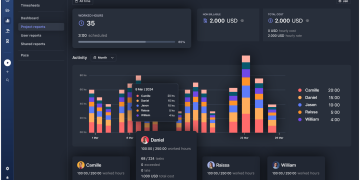Introduction
The human mind has long been a source of fascination, a boundless realm of thoughts, emotions, and potential. For centuries, philosophers, psychologists, neuroscientists, and artists have sought to understand the intricacies of the mind—its capabilities, its limitations, and its relation to human nature. But what exactly can the horizons of the mind reveal about who we are as human beings? In this exploration, we will delve into the many facets of human cognition, perception, and emotion, examining how the mind shapes our behavior, society, and even our very understanding of existence. The goal is not just to unlock the mysteries of the brain but to uncover deeper truths about human nature itself.
1. The Cognitive Landscape: Shaping Our Understanding of the World
At the heart of human nature lies cognition—the process by which we perceive, process, and interpret the world around us. Our minds act as filters through which we experience reality. Cognitive psychology seeks to understand how our thoughts, memories, and decision-making processes influence our behavior and interactions. The question of whether human cognition is inherently biased or objective has long been a subject of debate.
Perception and Biases:
Humans are not impartial observers of the world. Our perception is shaped by cognitive biases—patterns of thinking that lead to deviations from rationality. These biases often arise from the brain’s attempt to make quick, efficient judgments. For instance, the confirmation bias leads us to seek out information that confirms our preexisting beliefs, while the availability heuristic makes us overestimate the importance of information readily available to us. These biases reflect a more subjective, sometimes flawed, approach to understanding the world, challenging the notion of humans as purely rational beings.
Memory and Interpretation:
Memory, too, plays a crucial role in shaping our understanding of reality. The mind does not record experiences like a video camera; instead, memories are reconstructed and sometimes distorted. The malleability of memory highlights the mind’s active role in constructing personal narratives. Our past experiences, combined with our emotional state and social context, influence how we remember events. This dynamic process suggests that our sense of self is not fixed but constantly evolving, as the mind rewrites our past to fit our current understanding.
2. The Emotional Landscape: A Window into Our Instincts and Desires
Beyond cognition, emotions are central to human nature. They guide our actions, shape our relationships, and often define our experience of life. But what do our emotions reveal about who we are?

The Evolutionary Roots of Emotion:
Emotions are not just fleeting feelings but have deep evolutionary roots. They are survival mechanisms, fine-tuned over millennia to help humans navigate the complexities of social life and the natural world. Fear, for instance, heightens our awareness and prepares us for fight-or-flight responses, while love fosters bonding and cooperation. Anger, on the other hand, can signal injustice and fuel efforts to confront threats. These emotions reveal much about the survival needs of early humans, but they also highlight the ways in which emotional responses are shaped by context, environment, and personal experience.
The Dual Nature of Emotion:
Emotions can both connect and divide us. Empathy—the ability to understand and share the feelings of others—has been a key component in the formation of complex societies. It enables individuals to collaborate and form deeper social bonds, as it fosters cooperation and compassion. On the other hand, negative emotions such as envy, jealousy, and anger can drive conflict and division. These emotions can reveal the darker sides of human nature, pointing to the tensions between self-interest and collective welfare. In exploring these emotional dynamics, we gain a deeper understanding of human nature as a balance between connection and discord.
3. The Unconscious Mind: A Hidden Influence on Behavior
Much of human behavior is driven by forces beyond our conscious awareness. The unconscious mind—the realm of thoughts, memories, and desires that exist below the surface of conscious awareness—has profound effects on how we act, think, and feel. Sigmund Freud’s theory of the unconscious emphasized the power of repressed memories, desires, and unresolved conflicts in shaping behavior. Today, modern psychology recognizes the unconscious as a complex interplay of automatic mental processes that guide decisions and actions without our direct awareness.
Implicit Bias and the Unconscious:
Implicit biases are automatic associations we make between people, objects, or ideas based on previous experiences and societal influences. These biases operate outside of conscious awareness and can influence everything from hiring decisions to interpersonal interactions. While they may not always align with our conscious beliefs or values, implicit biases often reveal deep-seated attitudes and assumptions about human nature, highlighting the tension between our conscious ideals and unconscious drives.
The Role of the Subconscious in Creativity:
The unconscious mind also plays a vital role in creativity. Artists, writers, and scientists often speak of their “eureka” moments—those instances when inspiration strikes from nowhere. These flashes of insight are often the result of the unconscious mind working behind the scenes, synthesizing disparate ideas and experiences into novel solutions. The unconscious is not just a repository of repressed memories but a fertile ground for innovation and problem-solving, showcasing the mind’s ability to transcend linear, logical thought processes.
4. The Social Mind: Interconnectedness and the Collective Unconscious
Humans are inherently social creatures. Our sense of self is deeply intertwined with our relationships and the communities in which we live. Social psychology seeks to understand how group dynamics, societal norms, and cultural influences shape our behavior. The mind is not just a solitary entity but is shaped by social contexts, influencing our attitudes, beliefs, and actions.
The Impact of Society on the Mind:
From early childhood, humans are influenced by their social environment. Family, culture, education, and media all play significant roles in shaping our beliefs, values, and behaviors. This socialization process creates a shared reality—a collective understanding of norms, roles, and expectations that guide behavior within a given society. The mind, therefore, is not just an individual construct but a product of the collective culture in which it operates.
The Collective Unconscious:
Carl Jung’s concept of the collective unconscious suggests that humans share an innate, universal layer of unconscious knowledge. This collective consciousness includes archetypes—deeply ingrained symbols, patterns, and myths that transcend individual experience. According to Jung, these archetypes manifest in our dreams, art, literature, and myths, revealing fundamental truths about human nature. While modern psychology may not fully embrace Jung’s ideas, the notion that human minds share common experiences and symbols provides valuable insight into the universality of human nature.

5. The Mind’s Boundaries: Limitations and the Quest for Meaning
Despite the incredible capacities of the human mind, there are limitations. The mind is not all-powerful; it is constrained by both biological and environmental factors. Neuroplasticity—the brain’s ability to reorganize and adapt—demonstrates that while the mind is capable of remarkable feats of learning and growth, it is also susceptible to dysfunctions, limitations, and injuries.
Cognitive Limits:
Our attention span is finite, our memory is fallible, and our processing capacity is limited. In an age of information overload, the brain’s limited ability to absorb and retain vast amounts of data highlights the challenges of living in a rapidly changing world. Cognitive overload can lead to stress, anxiety, and decision fatigue, underscoring the importance of finding balance and creating environments that optimize mental well-being.
The Search for Meaning:
One of the most profound aspects of the human mind is its quest for meaning. Humans have an inherent desire to understand their place in the world, to find purpose, and to grapple with existential questions. Whether through religion, philosophy, science, or art, the mind seeks to make sense of the mysteries of life. This search for meaning reveals a fundamental aspect of human nature: the need to transcend the mundane and connect with something greater than oneself.
6. The Potential of the Mind: Human Nature’s Uncharted Territory
As we explore the horizons of the mind, we begin to uncover a vast, uncharted territory of potential. Human nature is not a fixed set of characteristics; rather, it is dynamic, evolving, and capable of extraordinary growth. The mind’s ability to adapt, learn, and innovate suggests that the future of humanity is limited only by the boundaries we place on our own thinking.
Mindfulness and Transformation:
One powerful tool for expanding the mind’s horizons is mindfulness—the practice of being fully present in the moment. By cultivating awareness of our thoughts, emotions, and behaviors, we can gain greater control over our minds and unlock new levels of cognitive and emotional intelligence. Mindfulness practices have been shown to reduce stress, enhance creativity, and improve overall well-being, revealing the mind’s remarkable capacity for self-regulation and transformation.
The Future of Human Potential:
As technology continues to advance, we are beginning to explore the possibility of augmenting the mind through artificial intelligence, neuroengineering, and biotechnology. While these innovations raise ethical questions, they also offer the promise of expanding human potential beyond its biological limits. The mind’s horizons, once thought to be confined to the biological brain, may soon stretch into the realm of machine intelligence, creating a new chapter in the story of human evolution.
Conclusion
The horizons of the mind offer a profound window into human nature. Through the study of cognition, emotion, the unconscious, social dynamics, and the quest for meaning, we begin to uncover the deep complexity of what it means to be human. The mind is both a reflection and a driver of human nature—a mirror of our instincts, desires, fears, and aspirations. By exploring the vast terrain of the mind, we not only learn more about ourselves but also gain insights into the future of humanity. The mind is a frontier waiting to be explored, revealing that the true nature of humanity may be far more expansive than we have ever imagined.























